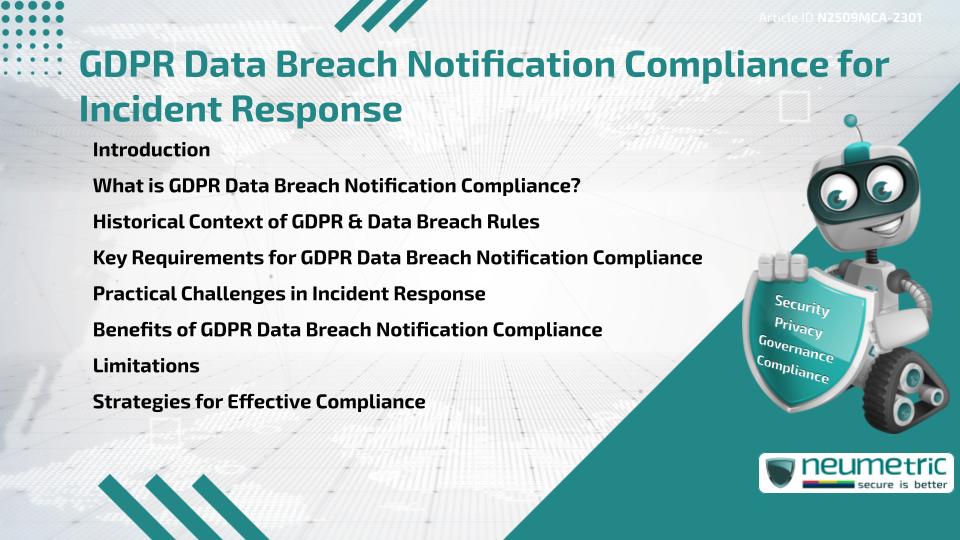Table of Contents
ToggleIntroduction
GDPR Data Breach Notification Compliance is a crucial part of Enterprise Incident Response. The General Data Protection Regulation [GDPR] requires organisations to notify authorities & affected individuals promptly when Personal Data Breaches occur. For businesses, this means implementing robust Incident Response Plans, Monitoring Systems & Governance Frameworks to reduce Risks of Penalties & Reputational Harm.
What is GDPR Data Breach Notification Compliance?
GDPR Data Breach Notification Compliance refers to meeting the specific requirements for reporting Breaches involving Personal Data. Article 33 of the GDPR mandates that organisations notify Supervisory authorities within Seventy-two (72) hours of becoming aware of a Breach. Article 34 requires informing affected Individuals when their Rights & Freedoms are at Risk. Compliance ensures Accountability & Transparency in Data Protection Practices.
Historical Context of GDPR & Data Breach Rules
The GDPR, effective since 2018, transformed Global Privacy regulations by strengthening consumer rights. Before GDPR, Data Breach reporting rules varied widely across EU member states. The harmonised Framework introduced strict timelines & significant fines, setting a Global Benchmark for Breach Notification laws. Guidance from regulators such as the European Data Protection Board further clarified how Incident Response processes should operate.
Key Requirements for GDPR Data Breach Notification Compliance
Enterprises must adhere to several obligations, including:
- Notifying supervisory authorities within Seventy-two (72) hours of a confirmed Breach
- Providing details such as the nature of the Breach, affected Data & Remedial measures
- Communicating with affected Individuals when Risks to their Rights are identified
- Maintaining Internal Records of all Breaches, even those not reported
- Aligning Incident Response processes with GDPR Principles of Accountability & Transparency
Practical Challenges in Incident Response
Compliance is not without hurdles. Detecting Breaches quickly can be difficult in complex IT Environments. Gathering the required Information within Seventy-two (72) hours often strains Resources. Coordinating across Legal, IT & Communications teams adds further complexity. Smaller businesses may lack the expertise to interpret GDPR obligations, increasing the Risk of Non-compliance.
Benefits of GDPR Data Breach Notification Compliance
Meeting GDPR Data Breach Notification Compliance Requirements provides several benefits:
- Reduced Regulatory Penalties by demonstrating Accountability
- Improved trust with Customers & Stakeholders through Transparency
- Stronger Governance & Resilience in Incident Management
- Enhanced Readiness for Audits & Supervisory Authority inquiries
- Alignment with International Best Practices in Privacy Protection
Limitations
Critics argue that strict reporting timelines may lead to incomplete Notifications, causing confusion for Regulators & Individuals. Some businesses see Compliance as burdensome, especially when Breaches involve large, complex Datasets. Others suggest that disclosure could damage Reputations even when Risks to individuals are minimal.
Strategies for Effective Compliance
To succeed, Enterprises should:
- Establish & Test Incident Response Plans regularly
- Train staff to identify & escalate Breaches promptly
- Use Automated Detection & Monitoring Tools to shorten response times
- Document all Breaches thoroughly to support Accountability
- Refer to Global Resources like NIST guidelines, OECD Privacy principles & World Bank Governance insights for additional context
Takeaways
GDPR Data Breach Notification Compliance is not just a Legal duty but a vital part of Incident Response. By embedding clear Processes, Automation & Governance into Operations, organisations can meet obligations, reduce risks & build Long-term trust.
FAQ
What is GDPR Data Breach Notification Compliance?
It is the obligation to report Personal Data Breaches to Authorities & Individuals within GDPR timelines.
How soon must Breaches be reported?
Supervisory Authorities must be notified within Seventy-two (72) hours of detection.
Who must be informed about a Breach?
Authorities must always be notified & affected Individuals must be informed if their rights are at Risk.
What challenges do Enterprises face?
Key challenges include rapid detection, gathering required Information & Coordinating Cross-functional Teams.
Does Compliance prevent Reputational damage?
Not entirely, but Transparency & Accountability can strengthen trust even during a Breach.
References
- European Data Protection Board
- NIST CyberSecurity Framework
- OECD Privacy Guidelines
- World Bank Digital Development
- ENISA – European Union Agency for CyberSecurity
Need help for Security, Privacy, Governance & VAPT?
Neumetric provides organisations the necessary help to achieve their CyberSecurity, Compliance, Governance, Privacy, Certifications & Pentesting needs.
Organisations & Businesses, specifically those which provide SaaS & AI Solutions in the Fintech, BFSI & other regulated sectors, usually need a CyberSecurity Partner for meeting & maintaining the ongoing Security & Privacy needs & requirements of their Enterprise Clients & Privacy conscious Customers.
SOC 2, ISO 27001, ISO 42001, NIST, HIPAA, HECVAT, EU GDPR are some of the Frameworks that are served by Fusion – a SaaS, multimodular, multitenant, centralised, automated, CyberSecurity & Compliance Management system.
Neumetric also provides Expert Services for technical Security which covers VAPT for Web Applications, APIs, iOS & Android Mobile Apps, Security Testing for AWS & other Cloud Environments & Cloud Infrastructure & other similar scopes.
Reach out to us by Email or filling out the Contact Form…


